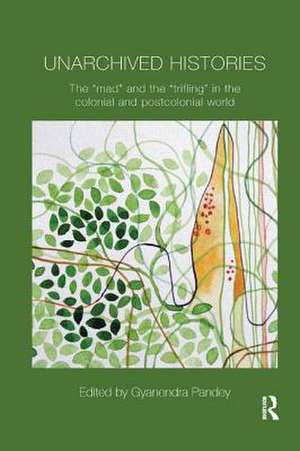Unarchived Histories: Intersections: Colonial and Postcolonial Histories
Editat de Gyanendra Pandeyen Limba Engleză Paperback – 26 oct 2017
Bringing together contributions covering South Asia, North and South America, and North Africa, this innovative analysis presents novel interpretations of unfamiliar sources and insightful reconsiderations of well-known materials that lie at the centre of many current debates on history and the archive.
| Toate formatele și edițiile | Preț | Express |
|---|---|---|
| Paperback (1) | 340.05 lei 3-5 săpt. | +17.20 lei 4-10 zile |
| Taylor & Francis – 26 oct 2017 | 340.05 lei 3-5 săpt. | +17.20 lei 4-10 zile |
| Hardback (1) | 1157.70 lei 6-8 săpt. | |
| Taylor & Francis – 24 dec 2013 | 1157.70 lei 6-8 săpt. |
Preț: 340.05 lei
Nou
Puncte Express: 510
Preț estimativ în valută:
65.13€ • 67.10$ • 54.56£
65.13€ • 67.10$ • 54.56£
Carte disponibilă
Livrare economică 03-17 februarie
Livrare express 17-23 ianuarie pentru 27.19 lei
Preluare comenzi: 021 569.72.76
Specificații
ISBN-13: 9780815373483
ISBN-10: 0815373481
Pagini: 186
Ilustrații: 4 Halftones, black and white; 4 Illustrations, black and white
Dimensiuni: 154 x 233 x 17 mm
Greutate: 0.31 kg
Editura: Taylor & Francis
Seria Intersections: Colonial and Postcolonial Histories
ISBN-10: 0815373481
Pagini: 186
Ilustrații: 4 Halftones, black and white; 4 Illustrations, black and white
Dimensiuni: 154 x 233 x 17 mm
Greutate: 0.31 kg
Editura: Taylor & Francis
Seria Intersections: Colonial and Postcolonial Histories
Cuprins
1. Unarchived Histories: The "Mad" and the "Trifling" Part 1: The State and its Record(s) 2. Peasant as Alibi: An Itinerary of the Archive of Colonial Panjab 3. A Death Without Cause: Mary E. Hutchinson’s Un-archived Life in Certified Death 4. "Standard Deviations": On Archiving the Awkward Classes in Northern Peru Part 2: Everyday as Archive 5. Feminine Ecriture, Trace Objects and the Death of Braj 6. Brown Privilege, Black Labor: Uncovering the Significance of Creole Women’s Work 7. Unfriendly Thresholds: On Queerness, Capitalism and Misanthropy in 19th Century America Part 3: Signs of Wonder 8. Of Kings and Gods: The Archive of Sovereignty in a Princely State 9. Geography’s Myth: The Many Origins of Calcutta 10. Un-archiving Algeria: Foucault, Derrida, and Spivak
Notă biografică
Gyanendra Pandey is Arts and Sciences Distinguished Professor, and Director of the Interdisciplinary Workshop in Colonial and Postcolonial Studies, at Emory University, USA. He is the author of Routine Violence: Nations, Fragments, Histories (2006) and A History of Prejudice: Race, Caste and Difference in India and the United States (2013), and editor of Subaltern Citizens and their Histories (2010) and Subalternity and Difference (2011), both published in the Routledge series ‘Intersections’.
Descriere
Descriere de la o altă ediție sau format:
Traditional historians hold that there can be no history without an archive. But how is one to write a history of prejudice where the evidence that identifies or signifies its everyday forms and discriminatory behaviour is scrappy and ambiguous? The common sense of polarised race, caste, class or gender relations is articulated in rarely archived, historically unpretty and unacknowledged actions. Out of what archive is the history of these practices, which are not events, not datable or even nameable, to be written? This book investigates the extensive domain of such histories, unarchived in the process of archiving those aspects of the human past and present that have been deemed significant at various times, for various reasons, by states, ruling classes and disciplinary historians.
Traditional historians hold that there can be no history without an archive. But how is one to write a history of prejudice where the evidence that identifies or signifies its everyday forms and discriminatory behaviour is scrappy and ambiguous? The common sense of polarised race, caste, class or gender relations is articulated in rarely archived, historically unpretty and unacknowledged actions. Out of what archive is the history of these practices, which are not events, not datable or even nameable, to be written? This book investigates the extensive domain of such histories, unarchived in the process of archiving those aspects of the human past and present that have been deemed significant at various times, for various reasons, by states, ruling classes and disciplinary historians.

























